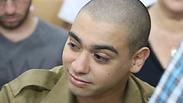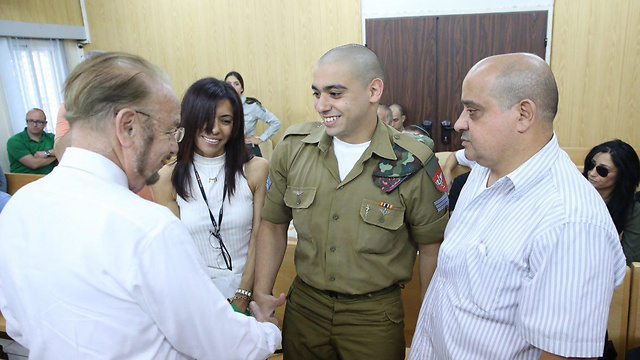
Military judge calls on Azaria, prosecution to withdraw appeals
In final appeal hearing, judges pose difficult questions to the defense, including why was Azaria the only one on the scene to open fire, and why he handed his helmet over to his friend before shooting if he was worried the terrorist carried a bomb.
Azaria's lawyer, Yoram Sheftel, was quick to accept the proposal and offered a two-week mediation process instead, but prosecutor Lt. Col. (res.) Nadav Weisman refused and insisted the court rules on the case.
Despite this, the judges called on the two sides to consider the request and asked the prosecution to raise the issue with the Military Advocate General. The court gave the two sides a week to reach a decision.
The military court at the Kirya IDF headquarters in Tel Aviv held what is supposed to be the final hearing in Azaria's appeal, during which the judges posed hard questions to Azaria's lawyer.
"None of the soldiers, officers or armed civilians at the scene, despite having felt danger, drew their weapon and shot the terrorist," Judge Zvi Segal told Sheftel.
Judge Brig. Gen. (res.) Avi Peled followed up, telling Sheftel, "What I'm not hearing from you is why the appellant, unlike everyone else at the scene, felt danger and opened fire?"
Sheftel claimed that "in the Jilani case only one police officer opened fire as well," referring to a 2010 incident in which a Border Policeman shot dead Ziad Jilani, a Palestinian terrorist who rammed his car into Border Policemen in east Jerusalem. The policeman shot Jilani at close range while the latter was lying on the ground. Some six months later, the Police Investigation Unit decided to close the investigation citing lack of sufficient evidence.
This isn't the first time Sheftel brings up the Jilani case. In a previous hearing, Judge Segal reprimanded Sheftel, telling him that "in the Jilani case, the soldier acted according to the rules of engagement."
Judge Segal also inquired whether "there is an explanation as to why Azaria handed his helmet over to his friend before shooting? After all, he was afraid (the terrorist carried) a bomb."
"I don't remember. He wasn't asked about that," Sheftel responded, adding "Is anyone examining such nuances? Why is Azaria being picked on with nuances?"
To this, Segal responded, "You claim in your appeal that Azaria made a professional error and nothing more. I can't find a single sentence in his testimony (to indicate that)... Azaria even explained in his testimony that everyone else was negligent, and he was right."
Judge Peled, who once served as the commander of the Golani Brigade, rejected Sheftel's response, saying "this isn't a professional answer. You don't remove the helmet for close range shooting."
"The company commander had nine versions, while Cpl. M. had 14 versions," Sheftel said, adding that "The only way to neutralize the terrorist in this situation was to shoot him in the head."
Sheftel went on to claim that the company commander's testimony was fabricated to Azaria's detriment.
Judge Segal questioned Sheftel about this claim, asking "How is it possible (company commander Na'aman) was not questioned (by the defense) on that? This is a critical key point the defense is basing its appeal on."
Sheftel insisted the company commander's testimony "was fabricated in the most disgraceful manner possible. His did a 180 with his version. It's a serious oversight that the previous defense attorneys didn't question the company commander on that. The fact there was no cross-examination on the matter is not enough to remove all doubts from his intolerable testimony."
Sheftel joined Azaria's defense team at a later stage and remained the sole lawyer after Eyal Besserglick, Ilan Katz and Karmit Scheiber decided to resign from the legal team over disagreements on whether to appeal the verdict.
Sheftel also rejected a claim made by the previous defense team that Azaria shot the terrorist after he had already died of the wounds he suffered when soldiers shot and neutralized him when he stabbed one of them. "I don't have to adopt every nonsense," Sheftel said.












